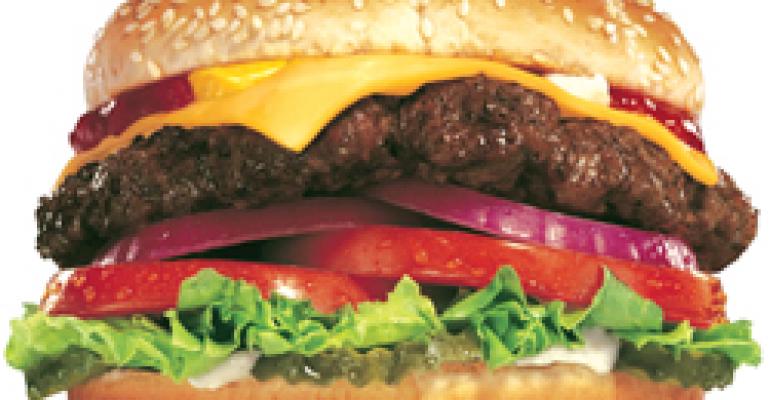Foodservice executives who still believed that taking a swipe at competitors in an ad campaign was a risk-free move were reminded recently of the dangers of making rivals the butt of humor in comparative-marketing efforts.
That reminder came when CKE Restaurants sued rival Jack in the Box last month over TV spots that allegedly disparage the Angus beef products of CKE’s Hardee’s and Carl’s Jr. chains.
Two spots promoting all-sirloin burgers at Jack in the Box play up their quality, but CKE alleges they also falsely imply that competitors whose sandwiches contain Angus beef are selling meat from a cow’s anus.
Just days after the campaign broke, CKE sued Jack in the Box in federal court in Santa Ana, Calif., alleging that the spots mislead consumers by suggesting that “Angus” is the same as “anus,” because of the way the word Angus is used in the commercials.
Hardee’s and Carl’s Jr. both sell burgers made with beef from Angus cattle, which meat lovers consider a premium breed. CKE’s chains and their franchisees operate 2,993 Carl’s Jr. and Hardee’s units. Jack in the Box has more than 2,000 restaurants.
Burger King, T.G.I. Friday’s and the Northwest regional Shari’s family-restaurant chain also sell Angus burgers in markets where they compete with Jack in the Box.
In high-profile test marketing, McDonald’s for several months has been promoting Angus burgers sold at 600 branches in Southern California, which is Jack in the Box’s largest market. McDonald’s will begin selling the Angus Third Pounder items in Boston and New York later this year.
The lawsuit comes as more restaurant chains are using comparative ads, and it raises memories of another legal battle over advertising that pitted Pizza Hut against Papa John’s, which ultimately prevailed over its competitor.
Pizza Hut sued Papa John’s in 1998, alleging that it aired misleading TV spots that disparaged Pizza Hut products. The suit wasn’t settled until 2000, when a federal appeals court overturned a lower court ruling that awarded Pizza Hut $468,000 in damages and banned Papa John’s from using its slogan, “Better Ingredients. Better Pizza.”
Although the appeals court found that some Papa John’s TV commercials were misleading, it ruled that “there is no evidence demonstrating that the slogan had the tendency to deceive consumers so as to affect their purchasing decisions.”
The Jack in the Box spots never mention the word anus, but CKE’s lawsuit alleges they create “phonetic and aural confusion” between Angus and anus.
In one spot, the chain’s mock-CEO mascot Jack walks into a staff meeting to announce the launch of the sirloin burger. He points to a diagram of a cow to show where the sirloin cut comes from. An employee notes that competitors serve Angus beef and asks Jack to point to that area. Jack seems to look at the cow’s rear, and then says, “I’d rather not.”
Another spot opens on employees cracking up during a meeting to discuss the competition’s Angus burgers. The woman leading the presentation stands in front of a sign that reads, “Competitor’s Angus,” but her head partially obscures the letter “g,” which causes her colleagues to laugh uncontrollably.
Jack then describes the new sirloin burger and takes a question from an employee: “Are you saying that people will find our sirloin more attractive than their Anguses?” He stumbles on the last word, causing more laughter.
CKE’s lawsuit asks that Jack in the Box be ordered to pull the ads and run “corrective advertising.” It also seeks unspecified damages.
Jack in the Box, based in San Diego, still aired the ads after the lawsuit was filed and issued a statement saying: “This lawsuit is completely without merit. With all the important cases facing the federal court system, it’s a shame to waste time and resources on such a trivial matter.”
Secret Weapon Marketing, the chain’s Santa Monica, Calif.-based ad agency, declined to comment.
Despite Jack in the Box’s statement, CKE believes the lawsuit has merit because the commercials are thought to mislead people who are not sure what Angus beef is, said Brad Haley, executive vice president of marketing for Carl’s Jr. and Hardee’s.
CKE conducted research before rolling out Angus burgers at both chains and discovered that there was some confusion about what Angus is, he said. Some consumers recognized Angus as what it is—a breed of cattle—but others thought it was a cut of beef or a quality grade like USDA Prime or Choice.
“Regardless, they all knew it was of better quality,” CKE’s Haley said. “We can’t allow someone to capitalize on the lack of knowledge of what Angus is and misrepresent it.”
A hearing on the lawsuit is scheduled for mid-June, he said.
As competitive pressure mounts, comparative advertising is on the rise. Quiznos Sub, Church’s Chicken, Subway and Pizza Hut have targeted competitors by name within the past year, but none of the advertisers was sued.
Marketers who make ad claims need “undisputable evidence” that the claims are valid, said Arjun Sen, president of the Denver-based consulting firm Restaurant Marketing Group.
Consumers are aware of various cuts of meat, but they’re not always certain which are better, he said. The Jack in the Box commercials might give consumers the impression that if they buy an Angus beef sandwich they are “getting meat of an inferior quality,” he said.
Although marketers need to be cautious when making ad claims, Sen said the ads could boost trial and give an initial “huge bump” to sales if the advertised product is supported with a strong public-relations campaign.
But advertising claims won’t necessarily sustain longer-term sales growth unless consumers see “a demonstrable difference” between the advertised product and the products of competitors, Sen said.

